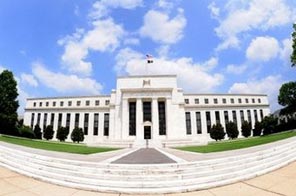Amid green shoots, Fed likely to keep taps open
WASHINGTON: Federal Reserve policymakers meet Tuesday amid rising signs the recession is receding but they are not expected to ease aggressive efforts to boost growth until recovery is well under way.
The Federal Open Market Committee meeting Tuesday and Wednesday is widely anticipated to hold unchanged its key federal funds rate at a historically low range of zero to 0.25 percent to spur lending and economic activity.
Economists say the financial markets will be closely watching the FOMC's statement accompanying its interest rate decision Wednesday for clues about the momentum of the world's largest economy, which seems to be emerging from the worst recession since the Great Depression.
Amid the growing optimism that recovery is at hand, the markets will be focused on whether the Fed, led by chairman Ben Bernanke, will adjust its unprecedented efforts to pump over one trillion dollars of liquidity into the stricken financial system, which some call "quantitative easing."
"Considering that the US economy remains in a fragile transition to recovery, we do not expect any surprises. The likelihood is that interest rates along with the Fed's asset purchase programs will remain unchanged," said Drew Matus, senior US economist at Merrill Lynch.
Brian Bethune and Nigel Gault of IHS Global Insight also said they expected no change in the target range for the federal funds rate, the overnight rate banks charge each other for using their Fed balances, which broadly impacts borrowing rates.
"Although the Fed's programs to purchase Treasury bonds and mortgage debt are not expected to be changed, the Fed's total balance sheet is expected to continue to shrink on net over the next several months," they said.
"The Fed's exit strategy is already in motion," they added.
Analysts expected the FOMC statement would be scrutinized for news about the Fed's 300-billion-dollar Treasury purchase program.
"The Federal Reserve is on pace to complete this program by mid-September and that would make this the last opportunity at a scheduled meeting for the Fed to enlarge this program," Merrill Lynch analysts wrote in a client note.
"Despite the recent decision by the Bank of England to grow their purchase program, we do not look for the Fed to follow suit," they added, noting that the program "was not effective in driving rates lower on a sustained basis."
The upbeat US economic outlook gained support from better-than-expected recent government readings on growth and unemployment.
Gross domestic product (GDP) -- the broad measure of the economy's activity -- fell at an annualized rate of 1.0 percent in the second quarter, after a 6.4 percent plunge in the January-March period.
Unemployment dipped unexpectedly in July to 9.4 percent, one-tenth point lower than the 26-year high hit in June. Although job losses narrowed to 247,000 from 443,000 in June, the labor market remained frail. A total of 6.7 million jobs have vanished from payroll since the recession began in December 2007.
On the eve of the Fed meeting, US stocks fell slightly, with the Dow Jones Industrial Average down 32.12 points or 0.3 percent after a surge of nearly 200 points last week.
"The Federal Reserve has been running a highly accommodative monetary policy. The additions of liquidity have put a bottom in nominal GDP growth rates," said Brian Wesbury, chief economist at First Trust Advisors.
A monthly survey of more than 50 business economists supported the view of growing optimism about prospects for economic growth in the second half of this year and in 2010.
"Close to 90 percent of our panelists believe the recession -- the longest and deepest in the post-World War II era -- will eventually be declared by the National Bureau of Economic Research (NBER) to have ended this quarter," the Blue Chip Economic Indicators report said Monday.
The Blue Chip consensus predicted GDP would grow at an annual rate of 2.2 percent in the current quarter and 2.3 percent in the fourth quarter. A 2.6 percent contraction in 2009 would be followed by 2.3 percent growth in 2010.
Merrill Lynch analysts said that the Term Asset Backed Securities Loan Facility, or TALF, aimed at boosting consumer and business lending, would also likely be a topic of discussion at the FOMC meeting.
"This program appears to be gathering some steam and the Fed may choose to extend the deadline for loans beyond the end of the year," they said.






